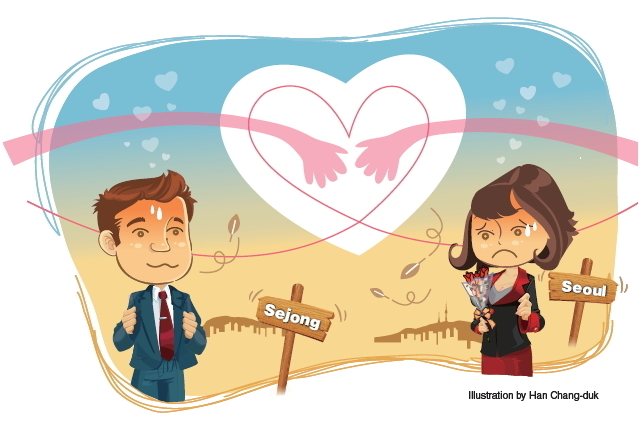
Park Jin-young, an administrator at the Ministry of Employment and Labor, has been experiencing some difficulties in her love life ever since her workplace was scheduled for relocation to Sejong City by the end of this year.
For the 30-year-old public servant, finding love and getting married remain important goals. But relocating to Sejong, 120 kilometers south of Seoul, has become a deal breaker in the eyes of single men she meets in the capital city.
“Guys hesitate to get to know me better when they find out I’ll be moving to Sejong. We’re all of marrying age, so they don’t want to meet a woman who will eventually be going far from Seoul,” Park said.
Such dating woes are also shared by her male counterparts, according to Duo, the country’s largest matchmaking company.
“Obviously, I won’t have as many opportunities as I have now to meet women. I’ll be devoting my whole weekend in Seoul to finding a girlfriend, or future wife,” said Pyun, 32, who asked to be identified only by his last name. He got himself a place near his work in the newly built administrative city, and plans to stay in Sejong during the week to avoid the four-hour trip to and from Seoul.
Park says about half of her colleagues working in ministries already based in Sejong have experienced breakups due to problems stemming from long-distance woes.
“Even now I usually get home at 11:30 p.m. I assume things will get even busier, constantly traveling between the National Assembly in Yeouido, Seoul, and the Sejong government complex,” Park said. “Will that leave time for us to meet someone?”
Officials at matchmaking companies say ministry officials come to Seoul on weekends to find a marriage partner, unless they grew up in an area near Sejong City.
“You can think of it (in the same way) as (you think about) a Korean worker who’s been sent abroad. They were dispatched to a really nice place because they have a really good job, but they hope to get married to a Korean,” said Kim Mi-yeon, an official from Duo.
But because demand for male government employees is so high from female locals, matchmaking companies are reportedly receiving membership fees of about 1 million won ($950) from female Sejong residents, while providing the same service to male officials for free.
According to a survey by Dou of 1,000 single women and men, government employees, who are known to have strong job security and a stable post-retirement income, were the most desired future spouses for Korean women (13.2 percent of respondents).
“It’s a stable job with a stable income, so they’re the most wanted partners for either sex. And because it’s so stable, it’s not an option for young officials to consider quitting their job, although that could have a considerable effect on their marriage and love life,” Kim explained.
By Suk Gee-hyun (
monicasuk@heraldcorp.com)
Kim Joo-hyun contributed to this report. ― Ed.








